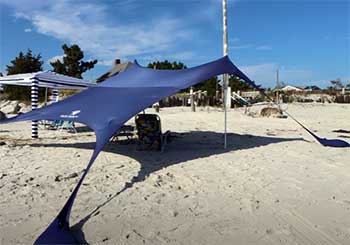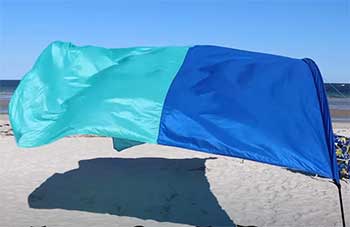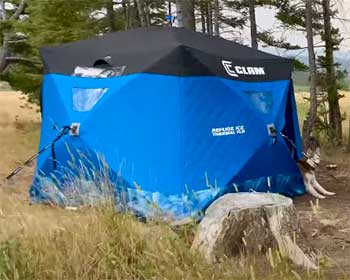When it comes to enjoying a sunny day at the beach, having the right shade is essential. Traditional beach shades, like umbrellas and pop-up tents, offer variety and budget options but can be bulky and struggle in the wind.
On the other hand, Shibumi Shades are lightweight, easy to set up, and excel in windy conditions but come at a higher price. In this article, I’ll share my personal experiences and insights to help you decide which shade best suits your beach needs.
Before we go any further, let’s quickly compare these two types of beach shades side by side.
A Brief Comparison Table
| Feature | Traditional Beach Shades | Shibumi Shades |
| Setup Time | Moderate to lengthy | Quick and easy |
| Portability | Varies (some bulky, some compact) | Highly portable |
| Shade Coverage | Good, but can vary depending on the model | Excellent, large coverage |
| Wind Resistance | Can struggle in high winds | Performs well in windy conditions |
| Durability | Depends on the quality of materials | Generally durable |
| Price | Range from budget-friendly to expensive | Generally higher, premium price point |
| Design Options | Wide variety of colors and styles | Limited but unique design |
Traditional Beach Shades Overviews
Traditional beach shades, including pop-up tents and umbrellas, have been the go-to for years. They come in various designs, sizes, and prices, making them a versatile option for beachgoers.
Pros of Traditional Beach Shades

- Variety: You can find an array of traditional beach shades, from classic umbrellas to pop-up tents. This variety means you can choose something that fits your style and needs perfectly.
- Coverage: Depending on the model, traditional shades can offer substantial coverage. This is particularly useful if you’re going with family or a group of friends.
- Customization: With so many designs available, you can pick something that truly stands out on the beach. Whether you prefer vibrant colors or muted tones, there’s something for everyone.
- Price Range: Traditional beach shades come in a wide price range. You can find budget-friendly options that do the job or invest in high-end models with extra features like UV protection and ventilation.
Cons of Traditional Beach Shades
- Setup Time: Some traditional shades can be a hassle to set up. Pop-up tents, for example, can be tricky to assemble and disassemble.
- Portability: While there are compact options, many traditional shades can be bulky and cumbersome to carry, especially if you’re hauling other beach gear.
- Wind Resistance: Traditional beach shades can struggle in windy conditions. A strong gust can easily knock over an umbrella or cause a tent to collapse.
- Durability: The durability of traditional shades can vary significantly. Cheaper models might not last more than a season or two, especially with regular use.
Overview of Shibumi Shade
Shibumi Shade has been making waves (pun intended) in the beach shade market. It’s a relatively new player but has quickly gained a loyal following due to its innovative design and ease of use.
Pros of Shibumi Shades

- Ease of Setup: One of the biggest selling points of Shibumi Shades is how easy they are to set up. You can have your shade ready in a matter of minutes, without any hassle.
- Portability: Shibumi Shades are incredibly lightweight and portable. They come in a compact carrying case that makes them easy to transport, even if you’re trekking across the sand.
- Wind Resistance: Designed to work with the wind, Shibumi Shades excel in windy conditions. Instead of fighting against the wind, they use it to stay upright and provide shade.
- Shade Coverage: Shibumi Shades offer extensive coverage, making them perfect for larger groups. The design allows for plenty of shaded space without feeling cramped.
- Durability: Made from high-quality materials, Shibumi Shades are built to last. They can withstand the elements and provide reliable shade season after season.
Cons of Shibumi Shades
- Price: Shibumi Shades tend to be on the pricier side. While they offer excellent features, the initial investment can be higher compared to traditional options.
- Limited Design Options: Currently, Shibumi Shades have a more limited range of design choices. If you’re looking for something specific in terms of color or pattern, you might not find it.
- Dependence on Wind: While they perform well in windy conditions, on extremely calm days, Shibumi Shades might not be as effective.
My Personal Take

Having used both traditional beach shades and a Shibumi Shade, I can tell you there are clear benefits to each, depending on what you’re looking for. Traditional beach shades offer a range of choices and can be very budget-friendly, but they can be cumbersome and less effective in windy conditions.
On the other hand, Shibumi Shades are a breeze (literally) to set up and are fantastic for windy beaches, but they come at a higher price and with fewer design options.
When to Choose Traditional Beach Shades?
- If you’re on a budget and need an affordable option.
- When you prefer a specific design or color.
- If you’re not worried about wind and need something for calm beach days.
When to Opt for a Shibumi Shade
- If you frequent windy beaches and need something that can handle the conditions.
- When you prioritize ease of setup and portability.
- If you’re looking for a durable, long-term investment.
Frequently Asked Questions (FAQs)
Shibumi is involved in legal actions to protect its patented design and technology from being copied by competitors. The details of specific lawsuits can change, so it’s best to check the latest updates from reliable sources for the most current information.
Some beaches have restrictions on certain types of shade structures, including Shibumi Shades, due to their unique design and size. These rules can vary by location, so it’s a good idea to check the specific regulations of the beach you plan to visit beforehand.
In my experience, the Shibumi Shade is definitely worth it if you value ease of use, portability, and performance in windy conditions. While it is a higher upfront investment, its durability and convenience can make it a cost-effective choice in the long run.
On days with no wind, Shibumi Shades might not perform as well because they rely on wind to stay upright. However, they can still provide some shade, but you might need to adjust it or use additional support to keep it functional.
Wrapping Up
Choosing the right beach shade really depends on your specific needs and preferences. If you prioritize a quick setup, portability, and wind resistance, the Shibumi Shade is a fantastic option despite its higher price point.
On the other hand, if you’re looking for something budget-friendly with a variety of designs, a traditional beach shade might be more up your alley.
In the end, both options have their pros and cons, and your choice will depend on what you value most for your beach experience. Whether you go with a traditional shade or a Shibumi, the most important thing is to enjoy your time at the beach and stay cool and comfortable under the sun.
So, what’s your pick? Traditional beach shade or Shibumi Shade?
Either way, I hope this guide helps you make an informed decision and enhances your beach outings. Happy beach days ahead!

